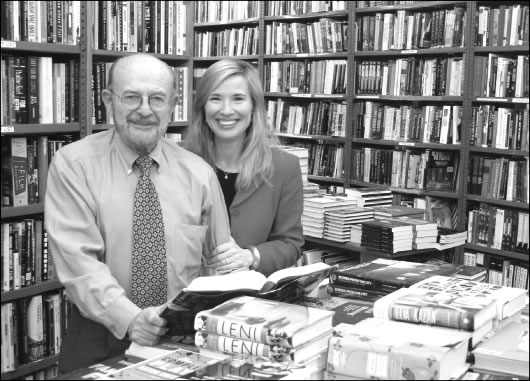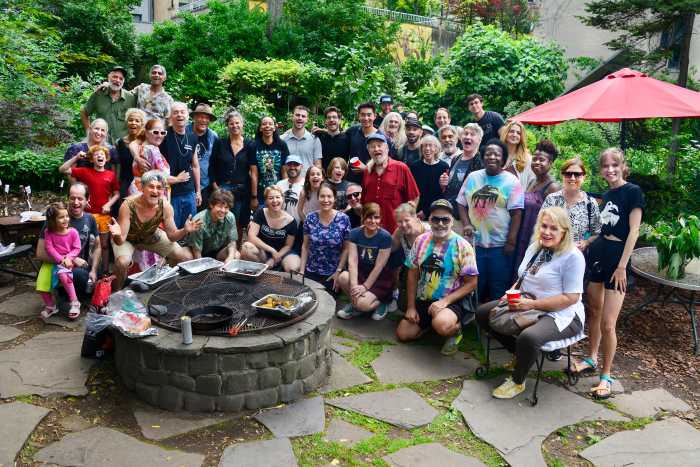By Jane Flanagan
On any given day at the Strand Bookstore you will find proprietor Fred Bass, 81, perched at the front book-buying counter with a pile of books stacked next to him. Flipping quickly through them, he’ll occasionally glance up to notice the streams of customers flowing through the store.
“You never know what someone is going to walk in with,” said Bass, a self-professed lover of what he calls the “treasure hunt.”
Fred is the second generation of the family ownership that has operated the bookstore for more than 80 years. In the mid-1950s, Fred moved the store from Fourth Ave. to its present location at the corner of 12th St. and Broadway and turned it into the world-renowned bookseller it is today.
On a recent weekday morning, four cashiers at the front counter were steadily ringing up customers. Walking along the corridors of this 55,000-square-foot store, you’ll find scores of employees — there are more than 200 — fielding queries from librarians, school teachers, estate lawyers, Hollywood producers, celebrities and, well, everyone else.
Fred runs the shop with his daughter Nancy Bass Wyden, who has ushered him into the 21st century by remodeling the space and adding air conditioning. Some of us remember the old Strand: stifling hot in the summer, checking bags at the front door and that musty, lovely, bookey smell. Fred clearly remembers those humbler days, too — he made sure that one of the store’s gigantic stone pillars, the one he looks up at from his post, remains unpainted, a stark reminder to himself and anyone else who pays attention of how things used to be.
There’s still plenty of “what used to be” operating today, with many employees still devoted to rare-book buying and selling. In the rare-book room, early editions of James Joyce and Ernest Hemingway line glass bookshelves. Some of the employees have been there for more than 30 years. The walls are lined with photos of writers such as Leo Tolstoy, Eugene O’Neill and Edna St. Vincent Millay.
In the remodeling, Fred was given a handsome, centrally located office, but he never managed to stay in it, so his bookkeeper took it over. Fred would much rather be at the book-buying counter, where every day, average and not-so-average folks walk in off the street to sell him books. Some days they are lined 20 deep outside the door.
“We’re the last place left besides a pawn shop where you can walk in the door and sell stuff,” said Bass, who evidently remembers a time when proprietors did this sort of thing all the time.
He should. His father, Benjamin Bass, opened the store in 1927 on Fourth Ave., the famous New York “Book Row,” stretching from Astor Place to Union Square. Benjamin, a Lithuanian immigrant living in Hartford, moved to the city at age 17. He got some kind of manufacturing job on Fourth Ave., and spent his lunch hours flipping through the used books. Finding himself enchanted, he started collecting them. Eventually, he scraped together $600 and opened his own used bookstore with a cigar box for his cash register.
The Strand is the sole survivor of Book Row, surviving the Depression and rising Manhattan rents. Common wisdom has it that Book Row died out for the usual reason — rising rents. But Fred has his own theory.
“People always say that the business faded away because of rent increases. It’s not true,” he said. “It’s because they didn’t teach anyone anything. They were strong, self-centered individuals. Competitive booksellers. They were protecting their knowledge, their turf.”
Fred apparently didn’t wait around to be taught. He started working Saturdays when he was 13. The family lived in the Bronx, and when it came time for college he commuted to Brooklyn College for morning classes and worked every afternoon at the store. He spent a week of his two-week leave during the Korean War at the store so his father could take a vacation. And when he came home from the service for good, he went down to the shop to help out for a few days and never left.
Not that his father thought this was a good idea. He tried to discourage him, viewing the used-book business as just too backbreaking and tough; he wanted something better for his son.
Fred laughed thinking about it.
“My uncle is 87,” he said. “He still remembers how my father always said to him, ‘You have got to get Fred to do something else!’”
In the mid-1950s Fred relocated the store to the present location, at the time a 4,000-square-foot space, an unheard of amount for a used bookseller back then. But Fred obviously knew he had the entrepreneurial skills to pull it off. He just kept working hard and expanding the business.
Today, the Strand sells much more than just used books — though these still do account for 35 percent of its sales. New books make up 40 percent of the store’s sales, 11 percent are publishers’ remainders, 6 percent are of rare books and 8 percent of sales are audio, DVD’s and Strand merchandise, including T-shirts, mugs and such. “Review books,” purchased from book reviewers, go for half the cover price.
Growing up with his dad must have instilled a boundless desire in Fred to succeed. Benjamin Bass was a one-man operation when he first opened up. Fred said that his father couldn’t leave the store unattended, so he did his book buying on Sunday mornings. Fred remembers climbing onto the subway with his father, who was loaded down with book bundles.
He also tears up recalling how during the Depression the landlord, “Old Man Stuyvesant” (last of the descendents of Peter Stuyvesant), refused to kick out any of the booksellers in his buildings. Benjamin fell a couple of years behind in his rent, and then later paid it all off. The Strand continued.
That’s not all that continued. As noted in a 1978 obituary, one of the major characteristics marking proprietor Benjamin Bass was that he “insisted on being the first one to review all the new books coming in.”
Clockwise from above left, a young Benjamin Bass with his Strand Bookstore when it was on Book Row on Fourth Ave.; his son Fred Bass working in the store at age 20.






































